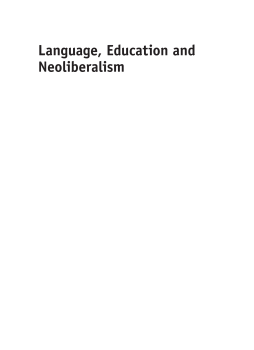
Additional Information
Book Details
Abstract
This edited volume presents an empirical account of how neoliberal ideas are adopted on the ground by different actors in different educational settings, from bilingual education in the US, to migrant work programmes in Italy, to minority language teaching in Mexico. It examines language and education as objects of neoliberalization and as powerful tools and sites through which ideological principles underpinning neoliberal societies and economies are (re)produced and maintained (and with that, inequality and exclusion). This book aims to produce a complex understanding of how neoliberal rationalities are articulated within locally anchored and historical regimes of knowledge on language, education and society.
This volume presents extensive research on the relationship between neoliberal ideology, language and education. One of the many strengths of this volume is in how a variety of methods and analytical approaches are deployed to address neoliberalism.
Andrew Jocuns, Thammasat University, Bangkok, Thailand
The wide-ranging, sharply observed, and detailed ethnographic studies in this smart volume demonstrate language education policies and practices designed to promote subjectivities and values working more to the advantage of global capitalism than to students. The volume also demonstrates the unevenness of such neoliberal language projects: their shortcuts, failures, broken promises – and actors’ points of resistance.
Mi-Cha Flubacher works in the Department of Linguistics, University of Vienna, Austria. Her research interests include language and work, and language and migration/integration.
Alfonso Del Percio works in the UCL Institute of Education, University College London, UK. His research interests include language and work, and language and political economy.
This book opens up a ground-breaking space for understanding how neoliberalism has permeated education worldwide and consequently affects the way people make sense of, and invest in, language and multilingualism. It captures and engages readers in the complexities of the triple resignification of education, of language and of the self. Essential reading for all those troubled by present challenges.
A rich collection of empirical studies showing how important language education and language of education are as terrains for struggles around neoliberal governmentality, and illuminating debates about what neoliberalism is, how it works for individuals, groups, corporations and states, and where its contradictions lie.
This book offers much food for thought for anyone interested in how language education is embedded in larger economic, political, social, and cultural processes.
David Block, University of Lleida, Spain
Table of Contents
| Section Title | Page | Action | Price |
|---|---|---|---|
| Contents | v | ||
| Contributors | vii | ||
| Series Editors’ Preface | xi | ||
| 1 Language, Education and Neoliberalism | 1 | ||
| 2 The Commodification of Language in Neoliberalizing China: The Cases of English and Mandarin | 19 | ||
| 3 ‘A Treasure’ and ‘A Legacy’: Individual and Communal (Re)valuing of Isthmus Zapotec in Multilingual Mexico | 37 | ||
| 4 From Language-as-Resource to Language-as-Struggle: Resisting the Coke-ification of Bilingual Education | 62 | ||
| 5 English as the Medium of Instruction in Korean Higher Education: Language and Subjectivity as Critical Perspective on Neoliberalism | 82 | ||
| 6 Internationalization and English Language Learning in Higher Education in Canada: A Case Study of Brazilian STEM Scholarship Students | 101 | ||
| 7 Neoliberalism in ELT Aid: Interrogating a USAID ELT Project in Southern Philippines | 122 | ||
| 8 Enterprising Migrants: Language and the Shifting Politics of Activation | 140 | ||
| 9 Assembling Language Policy: Challenging Standardization and Quantification in the Education of Refugee Students in a US School | 163 | ||
| 10 The Games People Play: A Critical Study of ‘Resource Leeching’ Among ‘Blended’ English for Academic Purpose Professionals in Neoliberal Universities | 184 | ||
| 11 Win-Win?! Language Regulation for Competitiveness in a University Context | 204 | ||
| 12 Neoliberal Reforms in Language Education: Major Trends, Uneven Outcomes, Open Questions | 229 | ||
| Index | 242 |
